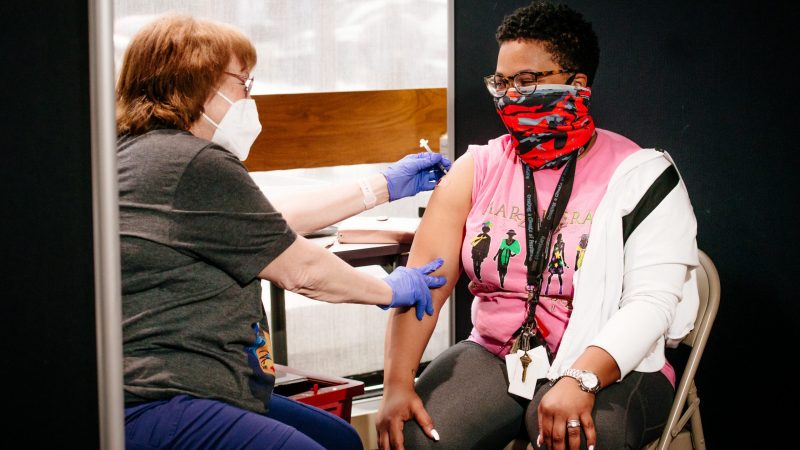Alabama Health Officials: ‘Plenty’ Of COVID-19 Vaccines
With more than enough supply to go around, Alabama health officials are urging more residents to get vaccinated against COVID-19. About 30% of Alabamians have received at least one shot of a COVID vaccine, but demand has declined in recent weeks, leaving thousands of unused doses sitting on shelves.
“The people who really wanted to have vaccine as quickly as they could get it, most of those people have been able to get it,” State Health Officer Dr. Scott Harris said during a media call Friday. “Now we’re left with people who maybe have problems of access, maybe they just need more information. So we continue to put that information out there.”
Harris said a federally-run mass vaccination clinic at Bessemer’s Watermark Place is only giving out about 120 shots a day, far below its capacity to deliver up to 1,000 doses daily.
According to officials with UAB Health System, demand at their four community vaccination sites in Birmingham has dropped by 78% in recent weeks.
Harris said people are hesitant to get the vaccine for many reasons, but the biggest problem is that some residents believe the vaccine is more dangerous than COVID-19.
“It’s simply not true,” Harris said.
To reach more people, the state health department is running television and radio ads, as well as limited door to door visits, stressing the “tangible benefits” of vaccination. Harris said vaccines are widely available in every county and the state will soon launch “public health teams” to offer vaccination to residents in rural communities, who may face additional barriers like transportation and taking time off work.
“We want people to be vaccinated because this is how we get back to normal,” Harris said. “This is how we can get to the point where we don’t have to wear masks and we don’t have to worry about distancing and we don’t have to worry about crowds.”
Last week, there was a 1% increase in the number of positive COVID-19 tests, but Harris said in general, cases, hospitalizations and deaths due to COVID-19 have declined to levels not seen since the beginning of the pandemic.
New York Giants hire John Harbaugh as coach after identifying him as their top choice
Harbaugh joins the Giants 11 days after he was fired by the Baltimore Ravens. The Super Bowl champion is now tasked with turning around a beleaguered franchise.
US launches new retaliatory strike in Syria, killing leader tied to deadly Islamic State ambush
A third round of retaliatory strikes by the U.S. in Syria has resulted in the death of an Al-Qaeda-affiliated leader, said U.S. Central Command.
NASA rolls out Artemis II craft ahead of crewed lunar orbit
Mission Artemis plans to send Americans to the moon for the first time since the Nixon administration.
Trump says 8 EU countries to be charged 10% tariff for opposing US control of Greenland
In a post on social media, Trump said a 10% tariff will take effect on Feb. 1, and will climb to 25% on June 1 if a deal is not in place for the United States to purchase Greenland.
‘Not for sale’: massive protest in Copenhagen against Trump’s desire to acquire Greenland
Thousands of people rallied in Copenhagen to push back on President Trump's rhetoric that the U.S. should acquire Greenland.
Uganda’s longtime leader declared winner in disputed vote
Museveni claims victory in Uganda's contested election as opposition leader Bobi Wine goes into hiding amid chaos, violence and accusations of fraud.






